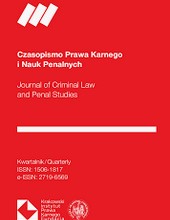Przekroczenie granicy i pobyt na terytorium Polski imigrantów w warunkach stanu wyższej konieczności
Crossing the border and staying on the territory of immigrants under conditions of state of necessity
Author(s): Witold Zontek, Szymon Tarapata, Wiktor AntolakSubject(s): Human Rights and Humanitarian Law, Politics and society, Migration Studies, Asylum, Refugees, Migration as Policy-fields
Published by: Polska Akademia Umiejętności / Krakowski Instytut Prawa Karnego Fundacja
Keywords: refugees; crisis; order; state of necessity; border crossing; duress; Polish-Belarusian border; state of emergency; restrictions on rights and freedoms;
Summary/Abstract: The refugee crisis on the Polish-Belarusian border related to the appearance on the border of a significant number of people who were brought to the territory of Belarus and then directed to the territory of Poland in an organized manner by Belarusian services led to a number of actions by, among others, Polish authorities, the legal aspects of which required urgent elaboration. This article addresses the issue of crossing the border and staying on the territory of immigrants under conditions of state of necessity. The considerations carried out in this text have proven that it is possible to legalize a foreigner’s crossing of the Polish border or stay in the Republic of Poland by invoking a state of superior necessity. Sometimes, too, such acts will result in the exclusion of guilt (when the migrant sacrifices a good of the same or greater value than the good being saved). It is also impossible to exclude the possibility of attacking the property of officers guarding the border area as a necessary defense. This is possible when service representatives commit unlawful acts against migrants. It is also permissible to take defensive action when, for example, officers, acting without any legal basis, take the migrants’ money or destroy phones belonging to them. This is because then a representative of the services, performing actions that are completely outside his competence, commits a direct and unlawful attack on other people’s movable property. The determination that the officers’ actions are the result of the execution of orders instructing them to commit crimes (in the absence of normatively effective authorization for the issuance of a specific order, such as push-back) leads to the conclusion that these behaviors are unlawful and a necessary defense is available against them.
Journal: Czasopismo Prawa Karnego i Nauk Penalnych
- Issue Year: 26/2022
- Issue No: 1-2
- Page Range: 113-136
- Page Count: 24
- Language: Polish

